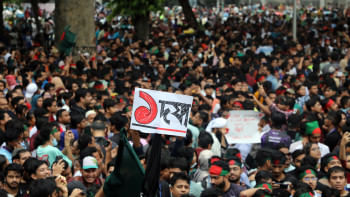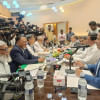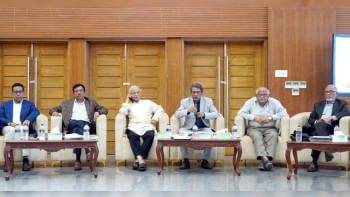The consensus to keep women out

The National Consensus Commission's recent decision to retain the existing 50 reserved seats for women, without direct elections, and to require parties to nominate women in a mere five percent of general constituencies, is a blunt proclamation that men alone will determine the limits of women's political presence. The composition of the consensus commission tells its own story: five heads of reform commissions, all men, negotiating with party delegations in which women were present in such negligible numbers you'd need a high-powered microscope to find them.
We should pause here to ask: who authorised these men—many of whom have never themselves won a parliamentary seat—to decide, on behalf of over half the population, how we are to be represented? What electoral, moral, or historical legitimacy entitles them to determine the numerical ceiling on women's political presence? If democracy is to have any meaning, such a question should not be settled in a closed meeting room between male elites but in the full light of public deliberation—at the very least, through a national referendum on how many seats should be reserved, and under what conditions.
If we situate this decision about women's seats within the broader arc of the post-uprising months, the pattern is unmistakable. The women's quota in public service has been abolished; women are underrepresented in the interim cabinet and nearly absent from the commissions shaping the constitutional and electoral future; and women student leaders who stood at the forefront of the anti-discriminatory movement have been pushed to the margins. Women politicians, journalists, and activists from across the political spectrum have been subjected to an unrelenting campaign of humiliation, harassment, and intimidation—deepfakes, doxxing, torrents of sexualised abuse—for the mere act of being visible and vocal in the public sphere. In short, the democratic opening created by the uprising has been followed, as in so many historical transitions, by a deliberate contraction of the political sphere in which women are allowed to operate.
This gendered silencing is being emboldened by a sharp rightward turn in national politics: the growing influence of right-wing groups who now shape policymaking from within, or mobilise mobs from without, to police women's bodies and restrict their freedoms. In such a climate, the fight for political representation is inseparable from the fight to hold public space itself; it is a struggle against a nexus of patriarchal control that stretches from the social media troll farm to the parliamentary chamber, from the street mob to the ministerial desk.
The political theorist Carole Pateman once described the "fraternal social contract" at the heart of liberal democracy: a pact among men to share power among themselves while defining women as dependents, auxiliaries, or symbolic figures. The consensus commission's decision is a textbook example of that contract at work. And it is not only women who are written out. Indigenous communities, religious minorities, persons with disabilities, and the rural and urban poor are almost entirely absent from these negotiations, their political demands diluted or erased before they ever reach the table. In this sense, the exclusion of women is part of a broader architecture of marginalisation—one that keeps entire populations out of meaningful political participation while preserving the supremacy of a narrow, elite fraternity.
The language of "gradual increase" that the consensus commission clings to is a dialect of delay, honed over decades, in which the pace of change is always just slow enough to keep men in power comfortably. It is telling that the political parties' objections to more ambitious proposals were framed in terms of "practical difficulties," as though the absence of women were an unavoidable natural condition, rather than the direct outcome of decades of deliberate exclusion.
When political parties plead that they cannot possibly field more women candidates, the more pressing question should be why such an excuse is treated as a reasonable defence in the first place. Under the Representation of the People Order (Amendment) Act 2009, any party seeking registration is required to set a target of reserving at least 33 percent of all committee positions for women, including in the central committee. They were supposed to have met that target by 2020. Every major party has openly failed to meet this requirement. In other words, this so-called shortage of capable women is the result of the parties' sustained non-compliance with the law.
How do these parties continue to enjoy legal registration when they have so openly violated the conditions for it? And how is it that the Election Commission, charged with safeguarding democratic integrity, has escaped scrutiny for its refusal to censure, sanction, or disqualify non-compliant parties, thereby converting a legal mandate into little more than decorative text? Will the honourable members of the consensus commission provide some clarity on this matter?
Some parties apparently argued, without irony, that because women and men have now achieved "full equality", the very idea of reserved seats is outdated. And yet, when asked to commit to nominating even 25 percent women in direct constituencies, these same parties recoiled, claiming they did not have "that many" suitable candidates. The contradiction is almost too perfect. The claim of equality is deployed as a weapon to dismantle the few structural safeguards that exist, while the lived reality of exclusion is invoked to justify continuing male dominance.
Political theory has a name for this manoeuvre: the rhetoric of achieved equality, in which formal declarations of parity are used to delegitimise affirmative measures, even as the structures producing inequality remain fully intact.
And then there are those who stated, quite openly, that men would "mind" if their seats were "given away" to women, as if parliamentary constituencies were the personal property of sitting male politicians. These seats are effectively treated as fiefdoms in a political economy where power is passed laterally among men.The resistance to women's inclusion, simply put, is about preserving the exclusive rights of a political fraternity to allocate the spoils of the state among themselves.
So what do women really want?
Fifty percent representation, of course, as should have been the foundational principle of the new political order we were promised in the wake of the uprising. To call this "fantastical" is to betray how thoroughly patriarchy has colonised our political imagination. In a moment when the slate was supposed to be wiped clean, when we had the rare chance to design the architecture of democracy anew, why should equality itself be treated as an impossible demand? Why are we still outsourcing the blueprint for the future to the same political parties that authored our exclusion in the first place?
Many women's rights organisations, recognising both the urgency of change and the entrenched resistance of the male political class, have advanced a compromise that is nonetheless structurally transformative: expanding parliament to 450 seats, with 150 reserved exclusively for women and filled through direct elections, alongside the existing 300 general seats. This is an intervention designed to alter the architecture of representation itself. By creating a parallel track of constituencies in which women compete on equal terms with other women, the model interrupts the patronage-based nomination systems that have long kept women tethered to male party leaders. It embeds women's electoral presence as a permanent and visible component of parliamentary politics, while also creating the conditions for them to transition into general seats over time. In political theory terms, it is a transitional mechanism: a deliberate distortion of the status quo to correct a historically produced imbalance, shifting the baseline from token inclusion towards genuine parity.
If the consensus committee and political parties are prepared to engage seriously with women's rights representatives and revise their decision, then let that engagement happen in the open, under public scrutiny. If not, then the question of women's political participation cannot remain the private bargaining chip of a political fraternity. These parties are historically male-dominated institutions whose organisational cultures, patronage networks, and selection processes are engineered to reproduce their own hierarchies. To expect them to deliver gender parity without structural compulsion is to mistake the jailer for the liberator. The project of egalitarianism cannot be subcontracted to the very custodians of inequality.
So, then, let the ultimate decision be made through a national referendum in which the very people whose representation is at stake—more than half the population—have the authority to determine the terms of their own political inclusion.
Let us remember that women have tilled this country's soil and staffed its factories, filled its classrooms and run its households, led its protests and sustained its movements. They have kept the economy alive in crisis and defended its streets in moments of danger. To exclude them now from the architecture of political power is an act of historical amnesia, a theft from the very foundation of the democratic project. If democracy is to mean anything beyond a stage-managed ritual, it must finally be rebuilt on the labour, leadership, and voices of those who have always been there, even when the record refused to see them.
Sushmita S Preetha is a writer and activist.
Views expressed in this article are the author's own.
Follow The Daily Star Opinion on Facebook for the latest opinions, commentaries and analyses by experts and professionals. To contribute your article or letter to The Daily Star Opinion, see our guidelines for submission.

 For all latest news, follow The Daily Star's Google News channel.
For all latest news, follow The Daily Star's Google News channel. 










Comments